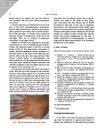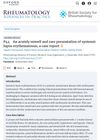 14 citations,
October 2012 in “Clinics in Plastic Surgery”
14 citations,
October 2012 in “Clinics in Plastic Surgery” Adding stem cells to fat grafts for facial rejuvenation might improve outcomes, but more research is needed to confirm safety and effectiveness.
14 citations,
May 2011 in “Physical medicine and rehabilitation clinics of North America” Burn reconstruction is crucial for improving long-term outcomes for burn survivors.
13 citations,
March 2011 in “Acta Paediatrica” Tinea capitis needs systemic treatment to avoid severe outcomes.
12 citations,
April 2020 in “Medical hypotheses” Men on 5-alpha-reductase inhibitors might have worse COVID-19 outcomes.
 9 citations,
March 2021 in “Hormones”
9 citations,
March 2021 in “Hormones” COVID-19 may affect male fertility and women might have better outcomes due to hormonal and immune differences.
 9 citations,
June 2020 in “Tissue Engineering and Regenerative Medicine”
9 citations,
June 2020 in “Tissue Engineering and Regenerative Medicine” HHORSC exosomes and PL improve hair growth treatment outcomes.
6 citations,
October 2006 Understanding repigmentation mechanisms in vitiligo can improve treatments and patient outcomes.
4 citations,
December 2021 in “Journal of Cosmetic Dermatology” Severe hair loss is linked to worse COVID-19 outcomes, especially in younger men.
 4 citations,
October 2020 in “Research Square (Research Square)”
4 citations,
October 2020 in “Research Square (Research Square)” Early treatment with certain drug combinations improved COVID-19 outcomes and prevented severe disease in males, including those at higher risk.
 4 citations,
December 2014 in “PubMed”
4 citations,
December 2014 in “PubMed” Pre-operative hormone treatment for hypospadias surgery might improve outcomes, but more research is needed to confirm.
3 citations,
May 2012 in “BMC Endocrine Disorders” Early diagnosis and hormone therapy can significantly improve outcomes for post-partum pituitary insufficiency in resource-limited settings.
 2 citations,
February 2022 in “Frontiers in Endocrinology”
2 citations,
February 2022 in “Frontiers in Endocrinology” Antiandrogenic pretreatment for women with PCOS does not improve fertility outcomes and delays pregnancy.
 2 citations,
May 2018 in “Expert opinion on orphan drugs”
2 citations,
May 2018 in “Expert opinion on orphan drugs” Newborn screening and gene therapy are expected to improve outcomes for Omenn syndrome patients.
 1 citations,
March 2021 in “The Journal of Sexual Medicine”
1 citations,
March 2021 in “The Journal of Sexual Medicine” The letter suggests testosterone replacement therapy might worsen COVID-19 outcomes.
 1 citations,
January 1999 in “Journal of the European Academy of Dermatology and Venereology”
1 citations,
January 1999 in “Journal of the European Academy of Dermatology and Venereology” Dermatology residents need thorough training in dermatosurgery for better patient outcomes.
 November 2024 in “Rheumatology Advances in Practice”
November 2024 in “Rheumatology Advances in Practice” Early recognition and treatment of SLE can improve outcomes in patients with complex symptoms.
 October 2024 in “Andrology”
October 2024 in “Andrology” Paternal drug exposure can harm fertility, pregnancy outcomes, and offspring health, with specific drugs linked to various reproductive issues.
 March 2024 in “Romanian Medical Journal”
March 2024 in “Romanian Medical Journal” Early diagnosis and treatment of achalasia and hyperthyroidism improve patient outcomes.

Sex hormones may affect COVID-19 severity and outcomes.

Dermatologists need better training on Black hair to improve care and outcomes.
 October 2023 in “Han'gug miyong haghoeji/Journal of the Korean society of cosmetology”
October 2023 in “Han'gug miyong haghoeji/Journal of the Korean society of cosmetology” Understanding psychological discomfort in hair loss can improve treatment outcomes.
October 2023 in “Perinatology and reproductology from research to practice” Combining medication for dyslipidemia and insulin resistance with basic therapy improves outcomes for alopecia areata with metabolic syndrome.
 October 2023 in “CHEST Journal”
October 2023 in “CHEST Journal” Early recognition and treatment of severe SLE symptoms can improve outcomes.
 July 2023 in “The journal of investigative dermatology/Journal of investigative dermatology”
July 2023 in “The journal of investigative dermatology/Journal of investigative dermatology” Assessing CD8+ T cell levels before surgery may improve vitiligo treatment outcomes.

Doctors using Google during patient visits can enhance accuracy and outcomes if done transparently and inclusively.
 July 2022 in “Dermatology Reports”
July 2022 in “Dermatology Reports” Low zinc levels might be linked to worse outcomes in various skin disorders.

Self-monitoring blood pressure in pregnant women didn't improve outcomes, diabetes drugs may increase gallbladder disease risk, a new drug helps severe hair loss, a plant-based COVID-19 vaccine is 69.5% effective, and new anticoagulants are safer for diabetics with heart rhythm issues than warfarin.
 February 2022 in “Research Square (Research Square)”
February 2022 in “Research Square (Research Square)” High TSPEAR levels in colorectal cancer predict worse outcomes.
 January 2022 in “Research Square (Research Square)”
January 2022 in “Research Square (Research Square)” High TSPEAR levels in colorectal cancer predict worse outcomes.
 November 2021 in “Research Outreach”
November 2021 in “Research Outreach” Low testosterone levels may lead to more severe COVID-19 outcomes.























